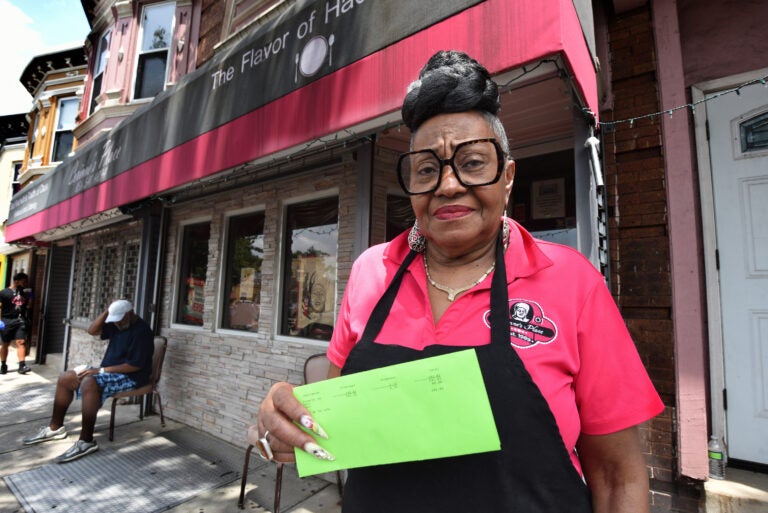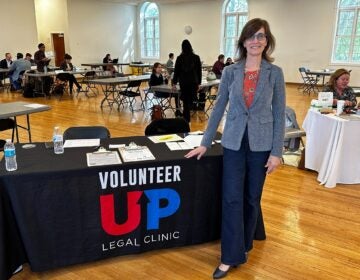Rude awakening for Camden property owners who thought N.J. delayed local tax deadline
A governor’s order allowed municipalities to extend the May 1 quarterly tax deadline by a month, to June 1. As many have now discovered, Camden didn’t.

On June 5, Corinne Bradley-Powers, owner of Corinne's Place, stands in front of her popular Camden restaurant holding the notice she received that her restaurant would be on a list for sheriff's sale this month if she didn't pay the $282 she owed. (Photo by April Saul for WHYY)
On June 5, Corinne Bradley-Powers stood in front of her iconic Camden restaurant, Corinne’s Place, and stared at the bright green tax notice in her hand.
“Un-freaking-believable,” she said. “They’re going to put my property up for tax sale because I owe $282. The audacity!”
That afternoon, a friend delivered Bradley-Powers’ payment to Camden’s City Hall on her behalf.
The same day, Dava Salas was at City Hall, asking a tax clerk to accept $1,000 cash toward the roughly $1,300 she owed to keep her East Camden house off the tax sale list. A year ago, Salas spent the summer working double shifts as a waitress at a popular boardwalk restaurant in Wildwood, then used her pay to restore heat and hot water to her house, Sheetrock the walls, and fix holes in the floor. She was serving at a Philadelphia restaurant when the coronavirus pandemic put her out of work in March; she applied for unemployment benefits but has yet to receive a single check.
The tax clerk said, no, that the partial payment was against “city hall rules,” said Salas.

Bradley-Powers and Salas had heard New Jersey Gov. Phil Murphy’s announcement on April 28 that, because of the pandemic, he was signing an executive order allowing municipalities to give property owners an extra month, until June 1 instead of May 1, to pay their quarterly taxes.
What they didn’t realize was that extending the deadline was optional, and that Camden was one of a number of municipalities where property owners would not be receiving that extra month. In Camden, once a property owner is delinquent, payment must be made in full and in person at City Hall with cash or a bank check.
Many recoil at making that trip during the pandemic, and numerous homeowners were late because of the confusion.
“In 35 years, I’ve never been late before! I thought we had an extra month,” said Vernna Farrish, a security guard who lives downtown. “Oh my God, I just got the money ready, they said I had to bring it up there.”

Process isn’t easy at Camden City Hall
East Camden resident Genevieve Porter brought a check to City Hall after her brother told her the deadline hadn’t been extended. But it was May 12, one day after the grace period, so they wouldn’t accept it.
“I said, `What about what the governor said?’ And the clerk said it didn’t apply to them, so I went and got a cashier’s check,” said Porter, who bristled at the $40 late fee and interest charges. “I was so upset, I said, ‘Maybe I’ll come back on Friday!’ and she said, `On Friday, we’re going to put more money on what you owe.’”
Fairview resident and tax preparer Fatima Grant didn’t realize the deadline hadn’t been extended until she went online to try to pay in mid-May. Currently out of work but with “a little cushion,” Grant paid but found the failure to extend the deadline disheartening.
“That time could have made the biggest difference. Maybe someone’s unemployment could have come through, or some people might have just gone back to work and gotten their first paychecks,” Grant said.
Landlord Vickie Gonzalez, who also assumed Camden was extending the deadline, had a tenant who was laid off in March as a day care worker and was unable to pay rent.
“She didn’t get her unemployment until last week,” Gonzalez said. When Gonzalez arrived at City Hall to pay her tax bill, including the late fee and interest, she told the clerk, ‘This is my business, and I’m not getting paid. How do you expect me to pay you?’”
The tenant eventually did pay her rent, but since evictions were on hold because of the pandemic, said Gonzalez, “I knew I couldn’t kick her out.”
Fear of contracting the coronavirus while paying in person made the situation more upsetting for property owners, many of whom are senior citizens. Property owners with mortgages often pay their taxes through their loan servicers, but those who own properties free and clear most often pay the city directly. City officials announced that property owners would have to wear masks, sign in, have forehead temperature scans, and enter the tax office no more than four at a time.
“You have to go and get cash,” said Fatima Grant. “and you don’t know whose hands have touched that money.”

Former Camden Councilman Brian Coleman is especially worried about older residents. “You have people here who are struggling and seniors who want to pay their taxes and don’t want to come out,” he said. “Why would you put those people in danger? Why put their health at risk? Is it money over lives?”
The office of Camden Mayor Frank Moran declined to comment on the decision not to extend the deadline, or on why property owners weren’t allowed to pay outstanding bills online or by personal check to avoid potential exposure to the coronavirus.
Melanie Walter, director of the Division of Local Government Services in the New Jersey Department of Community Affairs, said about half the state’s municipalities joined Camden in declining the extension. For those who are really behind on their taxes, she said, there is the potential advantage of an accelerated tax sale. Property owners are then eligible to buy the liens back by year’s end, at a much lower rate instead of 18% the following year. Camden is one of only nine cities in the state operating on a fiscal year budget that ends June 30, rather than a calendar year one, which makes it more daunting financially for city leaders to grant the extension.
The objective of the governor’s executive order, Walter said, was to offer help “without compromising the fiscal integrity of the towns. At the end of the day, they know their budgets best, and we wanted to provide them the flexibility to provide relief when they could.”

Show your support for local public media
Not just in Camden
In the small North Jersey community of Mine Hill, third-term Mayor Sam Morris made the same choice Camden leaders did.
“When the governor’s order came out, we had two days to react,” said Morris, who emphasized that he was not critical of the order. The next morning, his tax collector showed him a letter from a third-party mortgage processor.
“The email said, `We’re going to defer paying our taxes because you’re going to delay taking the payments.’” Because 85% of Mine Hill residents paid taxes along with their mortgages, Morris said, an across-the-board extension would not allow him to make payroll.
Morris did offer extensions for properties that were owner-occupied in which residents paid directly. “We asked people if they were having trouble to let us know,” said Morris, “but we didn’t get a single email.”
Mine Hill has a median income of roughly $95,000, with 7% of residents below the poverty line. In Camden, with a median income of only $27,000 and nearly 40% of residents living in poverty, the tax sale notices were met with not only anger and frustration, but suspicion of a land grab in the service of gentrification.
“Camden is a hot spot,” Corinne Bradley-Powers said, “because every day, they’re calling me, asking if I want to sell my property. What happened is the mayor sold his soul and promised all these investors they could have Camden. … My heart goes out to the people who’ve lived here all their lives, paid taxes, and next thing you know, they’re up there for a lien.”
For Sue Altman, a Camden resident and director of the New Jersey Working Families Alliance, the contrast between how the city treats its residents and the corporations that have been lured there with $1.6 billion of state tax breaks is stark.
“I understand the city needs money,” she said, “but when push comes to shove, why will they toe the line with residents who have been here for years and are experiencing hardships due to the pandemic and at the same time be so quick to offer tax abatements to corporations with shiny buildings on the waterfront?”
Parkside resident L’Tanya Brooks, who assumed Murphy’s executive order applied to Camden and also paid late, understands the city’s financial need but not its lack of sensitivity.
“I think the timing was not thought out. The city was strapped even before the financial hardship of the pandemic. Even though you want to make money, you have to consider the needs of your residents,” she said.
“If you want people to move back to the city,” said Brooks, a native of Camden who returned from Washington after retiring from the IRS, “this is not the image you want to project to get them back.”
In East Camden, Dava Salas waits. She’s been told she can return to her job at the shore restaurant should COVID-19 restrictions be relaxed.
“I’m praying,” she said, “that restaurants open up in time for me to make the money before this tax sale, because I can make that $300 in one day! As soon as Murphy gives us the OK to serve inside, I’m on my way to Wildwood.
“I’m going to walk there if I have to.”
Editor’s Note: Reporter April Saul owns a property in Camden and was late in paying her quarterly property tax bill, but has since paid in full.
WHYY is your source for fact-based, in-depth journalism and information. As a nonprofit organization, we rely on financial support from readers like you. Please give today.





